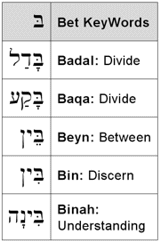Is Christ Divided?
Now this I say, that every one of you saith, I am of Paul;
and I of Apollos; and I of Cephas; and I of Christ. Is Christ divided?
was Paul crucified for you? or were ye baptized in the name of Paul?
1 Corinthians 1:12f (Spoke 2, Cycle 3)

The great theme of Spoke 2 derives directly from the archetypal geometric meaning of the Number 2 as
division. This theme saturates Spoke 2. It begins on the Second Day when God divided the waters,
and is reiterated in the Second Book when God divided the Red Sea. All of this is based on the
Bet KeyWords badal (divide) and beyn (between)
characteristic of Day 2. Its manifestation in 1 Corinthians is
most easily seen by simply quoting the relevant passages, of which there are many. I begin with
1 Corinthians 1:10:
Now I beseech you, brethren, by the name of our Lord Jesus Christ,
that ye all speak the same thing, and that there be no divisions among you;
but that ye be perfectly joined together in the same mind and in the same judgment.
For it hath been declared unto me of you, my brethren, by them which are of the house of Chloe,
that there are contentions among you. Now this I say, that every one of you saith, I am
of Paul; and I of Apollos; and I of Cephas; and I of Christ. Is Christ divided?
was Paul crucified for you? or were ye baptized in the name of Paul?
1 Corinthians 1:10f (Spoke 2, Cycle 3)
Note that this passage opens with reference to the name of our Lord Jesus Christ and
ends with reference to the name of Paul. This manifests the theme of the Names
subsumed in the primary Spoke 2 theme of the Word,
the title of the Second Divine Person. Its origin
is found in Inner Cycles > Genesis 2
with the first occurrence of the Hebrew שמות (shemuth, names).
This then integrates with the order of the Canon and the Hebrew name of the Second Book,
Shemuth. The theme of division continues in 1 Corinthians 3.1:
And I, brethren, could not speak unto you as unto spiritual, but as unto carnal,
even as unto babes in Christ. I have fed you with milk, and not with meat: for hitherto ye were not
able to bear it, neither yet now are ye able. For ye are yet carnal: for whereas there is among you
envying, and strife, and divisions, are ye not carnal, and walk as men?
For while one saith, I am of Paul; and another, I am of Apollos; are ye not carnal?
1 Corinthians 3:1 (Spoke 2, Cycle 3)
And again in 1 Corinthians 4:7:
For who maketh thee to differ from another? and what hast thou that thou didst not
receive? now if thou didst receive it, why dost thou glory, as if thou hadst not received it?
1 Corinthians 4:7 (Spoke 2, Cycle 3)
This then links to the KeyLinks between Jeremiah and 1 Corinthians based
on Glorying in the Lord. Finally, Paul repeats his concerns yet again in
1 Corinthians 11.17 where he transitions to heresies, which are divisions in doctrine.:
Now in this that I declare unto you I praise you not, that ye come together not
for the better, but for the worse. For first of all, when ye come together in the church, I
hear that there be divisions among you; and I partly believe it.
For there must be also heresies among you, that they which are approved may be made
manifest among you.
1 Corinthians 11:17 (Spoke 2, Cycle 3)
The depth of integration of these themes with the basic meaning of the Second Letter and archetypal
significance of the Number 2 is
truly astounding. In his discourse on speaking in tongues (note the theme of the Spoken Word),
Paul explains the problem precisely in terms of the
necessity of distinction
Now, brethren, if I come unto you speaking with tongues, what shall I profit you,
except I shall speak to you either by revelation, or by knowledge, or by prophesying, or
by doctrine? And even things without life giving sound, whether pipe or harp, except they
give a distinction in the sounds, how shall it be known what is piped or
harped? For if the trumpet give an uncertain sound, who shall prepare himself to the
battle? So likewise ye, except ye utter by the tongue words easy to be understood,
how shall it be known what is spoken? for ye shall speak into the air. There are, it may be,
so many kinds of voices in the world, and none of them is
without signification. Therefore if I know not the meaning of the voice, I
shall be unto him that speaketh a barbarian, and he that speaketh shall be a barbarian unto me.
We have here the essence of the Science of Linguistics - that is the Science of the Word -
which since the nineteenth century or so has
been built on the fundamental duality of the
Signified and Signifier  .
It seems God's Word was slightly ahead of the curve on this one - as usual! .
It seems God's Word was slightly ahead of the curve on this one - as usual!
| 


